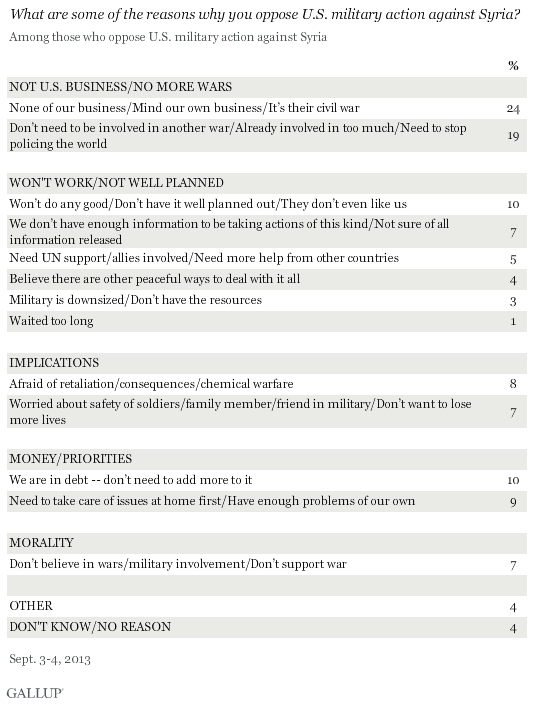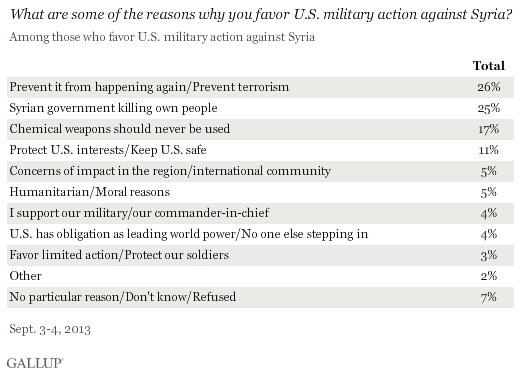PRINCETON, NJ -- Americans who oppose U.S. military action in Syria are most likely to explain their position by saying that the events in Syria are none of the United States' business, that the U.S. does not need to be involved in another war, or that the action is not well thought out, won't work, or would lead to negative consequences for the U.S.

Overall, Americans at this juncture are more likely to oppose (51%) than favor (36%) U.S. military action against Syria in order to reduce that country's ability to use chemical weapons.
President Obama has publicly announced his conviction that such military action in Syria is necessary and he has asked Congress to vote to authorize the use of military action. The president justified his intentions by saying that a "red line" is crossed when a nation uses chemical warfare, as Syria is accused of having done.
At a press conference in St. Petersburg, Russia, on Friday, the president was asked why members of Congress should go against the will of their constituents to vote for the military action. Obama responded by saying he considered it part of his job to "help make the case and to explain to the American people exactly why I think this is the right thing to do."
In making that case, the president's biggest challenge apparently will be to convince the public that it is the United States' business to take military action in order to reduce a country's ability to use chemical weapons, or that the plan for military action has been well thought through. Additionally, some Americans apparently will need their concerns mitigated about possible retaliation for any U.S. intervention; will need to be convinced that the monetary costs are worth it, particularly in light of pressing domestic issues; or will need to be persuaded that such military action is morally acceptable.
Americans in Favor Generally Agree With Obama's Rationale
Americans who favor taking military action in Syria are most likely to explain their position in ways that fit in solidly with the president's own rationale -- focusing on the need to act in the face of the unacceptability of chemical weapons use, the need to prevent such use in the future, and the need to stop the killing of Syrians. A small percentage of those favoring action say they do so to protect U.S. interests, because they support their commander in chief, or because they believe it is the United States' responsibility to lead such efforts.

Implications
The president has a tough challenge in front of him as he works to convince Americans and their elected representatives in Congress over the next several days that military action against Syria is justified. These survey results suggest he needs to address Americans' concerns that the conflict is not the nation's business at this time, that the U.S. cannot afford to get involved in another war right now, and that the proposed military scenario has been not been well thought through and planned.
Americans' skepticism does not appear to arise so much from a lack of awareness that the Syrians may have used chemical weapons -- although a small percentage say they don't believe the U.S. has enough information on that front. Instead, their opposition is based more on the idea that the U.S. should not expend money and resources to intervene, regardless of what the situation is in Syria.
Survey Methods
Results for this Gallup poll are based on telephone interviews conducted Sept. 3-4, 2013, on the Gallup Daily tracking survey, with a random sample of 1,021 adults, aged 18 and older, living in all 50 U.S. states and the District of Columbia.
For results based on the total sample of national adults, one can say with 95% confidence that the margin of sampling error is ±4 percentage points.
For results based on the sample of 529 adults who oppose military action in Syria, one can say with 95% confidence that the margin of sampling error is ±6 percentage points.
For results based on the sample of 375 adults who favor military action in Syria, one can say with 95% confidence that the margin of sampling error is ±7 percentage points.
Interviews are conducted with respondents on landline telephones and cellular phones, with interviews conducted in Spanish for respondents who are primarily Spanish-speaking. Each sample of national adults includes a minimum quota of 50% cellphone respondents and 50% landline respondents, with additional minimum quotas by region. Landline and cell telephone numbers are selected using random-digit-dial methods. Landline respondents are chosen at random within each household on the basis of which member had the most recent birthday.
Samples are weighted to correct for unequal selection probability, nonresponse, and double coverage of landline and cell users in the two sampling frames. They are also weighted to match the national demographics of gender, age, race, Hispanic ethnicity, education, region, population density, and phone status (cellphone only/landline only/both, and cellphone mostly). Demographic weighting targets are based on the March 2012 Current Population Survey figures for the aged 18 and older U.S. population. Phone status targets are based on the July-December 2011 National Health Interview Survey. Population density targets are based on the 2010 census. All reported margins of sampling error include the computed design effects for weighting.
In addition to sampling error, question wording and practical difficulties in conducting surveys can introduce error or bias into the findings of public opinion polls.
View methodology, full question results, and trend data.
For more details on Gallup's polling methodology, visit www.gallup.com.
